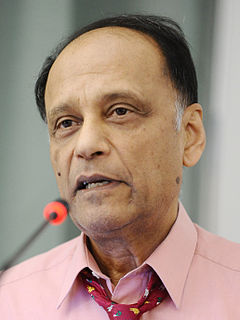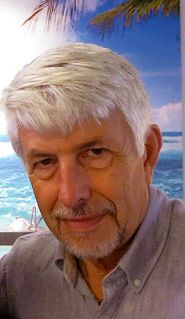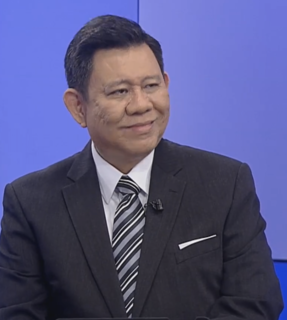Ecological modernization is a school of thought in the social sciences that argues that the economy benefits from moves towards environmentalism. It has gained increasing attention among scholars and policymakers in the last several decades internationally. It is an analytical approach as well as a policy strategy and environmental discourse.

Automaticity is the ability to do things without occupying the mind with the low-level details required, allowing it to become an automatic response pattern or habit. It is usually the result of learning, repetition, and practice. Examples of tasks carried out by 'muscle memory' often involve some degree of automaticity.

Sir Partha Sarathi Dasgupta, is an Indian-British economist who is the Frank Ramsey Professor Emeritus of Economics at the University of Cambridge, United Kingdom; Fellow of St John's College, Cambridge, and Visiting Professor at the New College of the Humanities, London.
Gary Alan Fine is an American sociologist and author.

Contemporary climate change includes both global warming and its impacts on Earth's weather patterns. There have been previous periods of climate change, but the current rise in global average temperature is more rapid and is primarily caused by humans. Burning fossil fuels adds greenhouse gases to the atmosphere, most importantly carbon dioxide and methane. Smaller contributions come from agriculture, industrial processes, and forest loss. Greenhouse gases warm the air by absorbing heat radiated by the Earth, trapping the heat near the surface. Greenhouse gas emissions amplify this effect, causing the Earth to take in more energy from sunlight than it can radiate back into space.
Feminist political ecology is a feminist perspective on political ecology, drawing on theories from Marxism, post-structuralism, feminist geography, ecofeminism and cultural ecology. Feminist political ecology examines the place of intersectional social relations in the political ecological landscape, exploring them as a factor in ecological and political relations. Specific areas in which feminist political ecology is focused are development, landscape, resource use, agrarian reconstruction and rural-urban transformation. Feminist political ecologists suggest gender is a crucial variable – in relation to class, race and other relevant dimensions of political ecological life – in constituting access to, control over, and knowledge of natural resources.
Mary McCanney Gergen was an American social psychologist specializing in feminist studies women's studies and social constructionism. She is known for her contributions to the field of feminist studies, organization development, and social process.
In its broadest sense, social vulnerability is one dimension of vulnerability to multiple stressors and shocks, including abuse, social exclusion and natural hazards. Social vulnerability refers to the inability of people, organizations, and societies to withstand adverse impacts from multiple stressors to which they are exposed. These impacts are due in part to characteristics inherent in social interactions, institutions, and systems of cultural values.

Robert Gifford is professor of Psychology and Environmental Studies at the University of Victoria. His main research interests are environmental psychology, social psychology and personality psychology. He has worked on nonverbal behavior and on climate change behavior barriers. Gifford is the author of five editions of Environmental Psychology: Principles and Practice, which has also been translated into Japanese, and edited Research Methods for Environmental Psychology (2016). From 2004 to 2016, he was the editor in chief of the Journal of Environmental Psychology. Gifford is also on the editorial boards of Architectural Science Review and Applied Psychology. He has been president of the environmental divisions of the American Psychological Association, the International Association of Applied Psychology and the Canadian Psychological Association.
Robert W. Kates was an American geographer and independent scholar in Trenton, Maine, and University Professor (Emeritus) at Brown University.

Jerome (Jerry) Ravetz is a philosopher of science. He is best known for his books analysing scientific knowledge from a social and ethical perspective, focussing on issues of quality. He is the co-author of the NUSAP notational system and of Post-normal science. He is currently an Associate Fellow at the Institute for Science, Innovation and Society, University of Oxford.

Sukhadeo Thorat an Indian economist, educationist, professor and writer. He is the former chairman of the University Grants Commission. He is professor emeritus in Centre for the Study of Regional Development, Jawaharlal Nehru University. He is an expert on B. R. Ambedkar.

Steve Yearley is a British sociologist. He is Professor of the Sociology of Scientific Knowledge at the University of Edinburgh, a post he has held since 2005. He has been designated a Fellow of the Royal Society of Edinburgh. He is currently Director of the Institute for Advanced Studies in the Humanities.
Sheldon Krimsky was a professor of Urban and Environmental Policy and Planning at Tufts University, and adjunct professor in the Department of Family Medicine and Community Health at Tufts University School of Medicine. He was a fellow of the Hastings Center, an independent bioethics research institution.

Arnold Jerome Berleant is an American scholar and author who is active in both philosophy and music.

This bibliography of Sociology is a list of works, organized by subdiscipline, on the subject of sociology. Some of the works are selected from general anthologies of sociology, while other works are selected because they are notable enough to be mentioned in a general history of sociology or one of its subdisciplines.
John Widdup Berry is a psychologist known for his work in two areas: ecological and cultural influences on behavior; and the adaptation of immigrants and indigenous peoples following intercultural contact. The first is broadly in the domain of cross-cultural psychology; the second is in the domain of intercultural psychology.

Julio Cabral Teehankee is a Filipino political scientist. He is Full Professor of Political Science and International Studies at De La Salle University (DLSU) where he served as Chair of the Political Science Department (1994–2007); Chair of the International Studies Department (2008–2013); and Dean of the College of Liberal Arts (2013–2017).

Sander L. van der Linden is a social psychologist and professor of social psychology in society in the department of psychology at the University of Cambridge, England where he has directed the Cambridge Social Decision-Making Laboratory since 2016. He is also a fellow and director of studies in psychological and behavioural sciences at Churchill College, Cambridge, a research affiliate of the Yale Program on Climate Change Communication at Yale University and the Winton Centre for Risk and Evidence Communication at the University of Cambridge.
Ecological grief, also known as climate grief, refers to the sense of loss that arises from experiencing or learning about environmental destruction or climate change. Environmental grief can be defined as "the grief reaction stemming from the environmental loss of ecosystems by natural and man-made events." Another definition is "the grief felt in relation to experienced or anticipated ecological losses, including the loss of species, ecosystems, and meaningful landscapes due to acute or chronic environmental change." For example, scientists witnessing the decline of Australia's Great Barrier Reef report experiences of anxiety, hopelessness, and despair.










